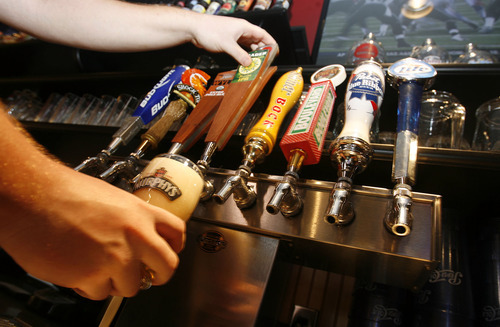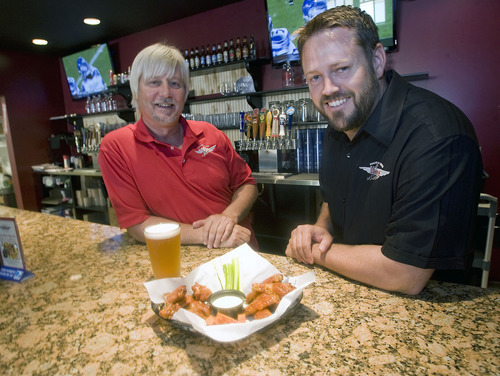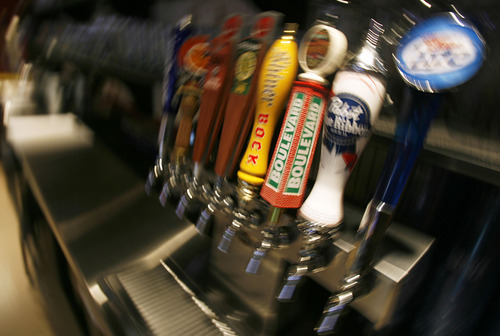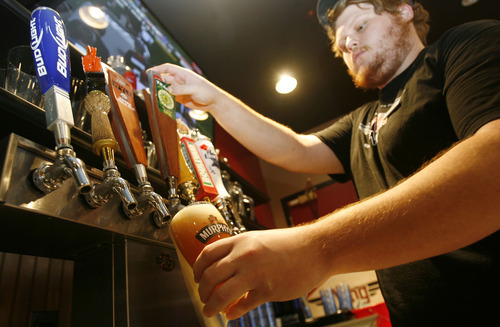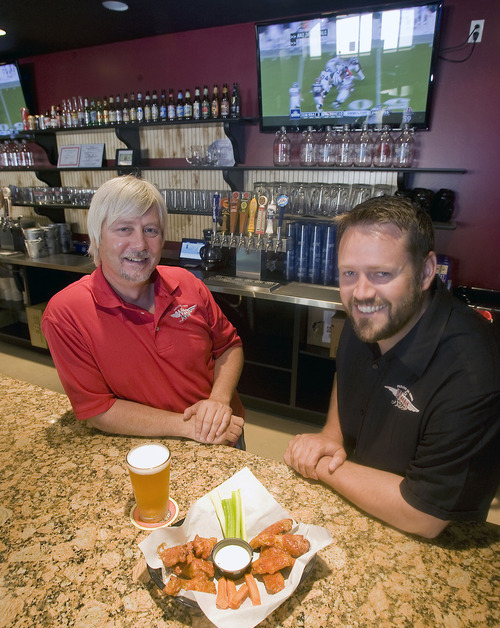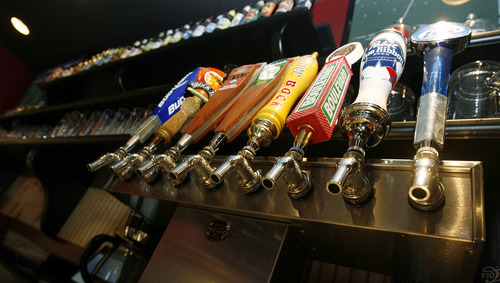This is an archived article that was published on sltrib.com in 2011, and information in the article may be outdated. It is provided only for personal research purposes and may not be reprinted.
So-called Zion curtains separating diners from bartenders are not only back, the opaque partitions unique to Utah are now closing on eateries whose only alcoholic beverage is beer.
Restrictions placed on new beer-only restaurants are driving at least one Utah chain, Wing Nutz, to expand out of state. Another, Wingers Bar & Grill, is questioning whether it should open more restaurants in the state.
The change means servers at new eateries that serve only beer may not pop off a cap on a beer bottle or pull the tab on a can in view of customers. They must install partitions or build backrooms to store or pour beer with a 3.2 percent alcohol content by weight. Heavier beer is not allowed.
The restrictions are spelled out in two separate bills passed last spring and this summer. Language in the bills is confusing, and key lawmakers said Monday they're unclear who spearheaded the effort to require partitions in beer-only eateries.
Rep. Greg Hughes, R-Draper, who spoke for one of the bills in the House, said he is not sure that the legislation "is what we envisioned it to be."
The partitions "accomplish nothing," Melva Sine, Utah Restaurant Association chief executive, said Monday. "This serves no purpose. This is the same beer that children see sold in hundreds of supermarkets and convenience stores throughout Utah."
The partitions will be similar to those that hide bartenders mixing a full range of drinks in restaurants that opened after January 2010. Lawmakers approved that restriction in 2009.
The newer liquor control bills — SB314 and SB2002 — require patrons to order food with their beers, and effective March 1, 2012, none of the eateries may have beer sales that exceed 30 percent of their revenue.
They change liquor licensing categories and required establishments to declare themselves beer-only restaurants by Aug. 1 or face having to build barriers around existing bars. Liquor officials say of 366 establishments, 307 declared themselves beer-only restaurants.
In addition, any new beer-only restaurants must install partitions or pour where patrons can't see beer being dispensed.
Sen. John Valentine, R-Orem, who sponsored the legislation, said he does not agree that partitions should be installed at beer-only restaurants, but he included the provision to get the bill passed.
Senate President Michael Waddoups, R-Taylorsville, who supported backrooms to hide bartenders at restaurants serving wine and mixed drinks, said he did not push for partitions at beer-only restaurants — and he doesn't know who did.
Waddoups suggested that Mothers Against Drunk Driving might have wanted the partitions, but MADD Utah chapter President Art Brown said he is unfamiliar with the requirement.
Despite the confusion over who spearheaded the change, Zion curtains are harming business, said Eric Slaymaker, president and founder of Wingers, which has 23 locations in Utah and 14 restaurants in Idaho, Oregon, Washington, Wyoming, Nevada and Tennessee.
"The Legislature says it is business-friendly, but I have a hard time believing that," he said. "Utah had made some great strides in becoming part of the real world, but now we're making strides to let the world know they aren't welcome here again."
The restrictions likely will prohibit Wing Nutz from expanding in Utah, co-owner Will Miller said. "We want our customers to feel relaxed, that we won't be pushing them out the door," he said. "Now we'll have to explain why we have to open a bottle of beer in a backroom and why we can't have working taps in any of our new stores. This goes against our concept, which is one of the reasons we've been able to expand so quickly."
Wing Nutz, which opened its first restaurant in the fall of 2008, has 12 Utah locations, and is set to open four more beer-only restaurants in Salt Lake City, Taylorsville, Murray and Lehi before the end of the year. All have bars covered by the bills' grandfathering clause.
But other locations planned for Spanish Fork, Centerville, Logan and Tooele are on hold because of the new restrictions. The chain also has two restaurants in Idaho, and is considering expanding into Denver.
Neither Waddoups nor Valentine plan to change legislation requiring beer-only partitions. Hughes did say that he would look into the matter.
Lawmakers have retrenched on liquor laws since 2009, when then-Gov. Jon Huntsman Jr. successfully pushed to do away with the state's one-of-a-kind private club memberships. Legislators — a majority of whom belong to The Church of Jesus Christ of Latter-day Saints, which eschews alcohol — pushed back.
Since then, lawmakers have reinstated Zion curtains, outlawed drink specials and refused to free up more bar licenses, which are in such short supply that none is likely to become available for the next two years. —
Beer-only restaurants
According to a new law:
• New eateries must hide servers pouring beer from bottles, cans and taps.
• Diners at all beer-only eateries must order food before they can get a beer.
• All sales must be at least 70 percent food and no more than 30 percent beer.
Other liquor restrictions:
• No more daily drink specials
• The 5-liter, mini-beer keg Chubby outlawed on Oct. 1.
• No more club or bar licenses for up to the next two years.
• Bartenders at restaurants open after January 2010 must be hidden from public view.


